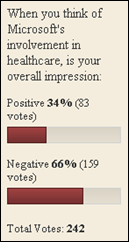There was a recent report pointing to increased Medicare costs when patients returned to traditional Medicare, of course assuming that…
Monday Morning Update 2/1/10
From You’ll Know Who: “Re: Horizon Enterprise Revenue Management. Some observations from MCK’s January 26 conference call. It was said that HERM was designed ‘with an architecture similar to our clinical systems,’ which means it isn’t the same and not likely to be very integrated. Still scratching my head on the HERM amortization costs. Software revenue had to be deferred for ANY contract that mentioned HERM before it became GA. Now that it’s GA (supposedly), why is profit still declining and why did it trigger so much incremental amortization? McKesson tried to develop HERM quick and cheap in India, and when it didn’t work, executives were fired and the rumor now is that development is moving to Mexico. What happened to the original pilots, Gwinnett in Atlanta and Peninsula in Maryland?” All unverified. I still haven’t heard back from the Baptist CIO. I’ll say this: revenue cycle has been the Vietnam War of some big vendor superpowers. I was also thinking – is this the first product McKesson has actually built from scratch rather than bolted on from an acquisition? Maybe not, but I just can’t think of others.
From Lady IT: “Re: Sisters of Saint Francis. The rumor is true. I work for the vendor who is being displaced.” Hoosier is working there and agrees, saying Epic was chosen over McKesson.
From Bobby Orr: “Re: Rutland. They actually went Cerner for the EMR, not GE. Also, the vendor relationship movie was excellent. I think I’ve met some of those people in real life.” I thought that parody of bargain-seeking customers was funny, with excellent acting. Like my hero from the video says, we can do this!
From PeaPicker: “Re: CCHIT. Their committees haven’t met in a month and have done nearly nothing since early fall. CCHIT is completely focused on ARRA and has no interest in anything else.” Like the rest of the industry, unfortunately.

From Arnell: “Re: Riyadh Military Hospital. Is this a loss for QuadraMed? Saudi Arabian National Guard went live with then-Misys CPR in Fall 2004. Those implementations were also military hospitals. As a side note, it is interesting that when issues were created for that project, severity levels were determined by whether there was a member of the Royal Family involved as a patient or user.” Not much different than the small community hospitals I’ve worked in, where the entire facility went on red alert when a relative (even a distant one) of the hospital administrators or key doctors showed up. I’m not making this up: at one small hospital that was owned by a national for-profit chain, we management team members were convened in emergency session because the mother of our obnoxious eye surgeon had been admitted. Apparently the care those administrators oversaw for everybody else wasn’t good enough for people with connections. I wouldn’t exercise that privilege, though: I think you increase your chance for medical misadventure by breaking out of the routine.
From PBnJ: “Re: industry newbie. Which HIT publications should I subscribe to to learn, preferably free or low-cost ones?” You’re asking the wrong guy since I don’t read a single one of them, either hard copy or online, except for Inside Healthcare Computing. Try this test: go to the online site or current issue of any of them. Ask yourself, “Which stories gave me timely information that I can truly use in an informed manner?” Read the bios of the people involved – have they ever worked in healthcare? How quickly did the publication report on real news? Is the reporting balanced, or just typical fluff? If articles covered hospitals or people you know, were they accurately portrayed?
In honor of my intentionally politically incorrect logo, a reader sent links to smoking doctor posters from the 40s. I think I’ve run a couple of them before (Link 1, Link 2, Link 3). The guy above must be really good if the comparative size of his reflector is any indication. Using doctors to pitch cigarettes reminds me of the early days of the White Castle hamburger chain, which fed doctors and nurses workers free if they showed up in uniform, which inspired confidence in their product (kind of like the HIMSS conference). In those minimally regulated days before In-N-Out and Five Guys, people were wary of eating hamburgers in restaurants, probably for good reason.
My calendar is surely defective. It cannot possibly be February already and just four weeks until HIMSS.
Speaking of HIMSS, initial response to the HIStalk reception was brisk, with over 100 RSVPs within the first couple of hours of the posting late Thursday night and 200 by Friday morning. The cutoff is 300, so thanks both to those who signed up and especially those may get shut out despite trying. I really appreciate the support (well, admittedly it’s free food and drinks and not exactly support per se, but I see lots of kindred spirits on the list). I hope folks will take pictures and send them afterward so I can show everybody can see how smart and cool HIStalk readers are.
Update: I got the RSVP list so far. Most common titles: VP variants (47) and CEO or president (40). Lots of CIOs, CMOs, consultants, etc. Many are familiar names, some listing new employers since I checked last. Nobody from my hospital is on the list, which is either good from my anonymity perspective or bad in the sense that my own co-workers don’t even read HIStalk (as Inga, would say, “Losers!”) I also like it when people leave comments with their RSVP, such as these: (a) Always love this event and the chance to mingle; (b) Save a dance for me, Inga; (c) Yours is the best networking, and most entertaining, event at HIMSS!; (d) Looking forward to chatting with all my HIStalk friends; (e) Always the best party of spring; (f) Many thanks to the kind hosts; and my favorite, (g) WooHoo! A couple of the comments even invited us to other parties, which was nice. Since I’m privy to who’s coming, I’ll share this: it is a stellar, fun group with lots of recognizable names. Deals will be made, people will be hired, and newsworthy events will result. Special thanks to the sponsors of HIStalk, HIStalk Practice, and HIStalk Mobile who are dropping by.
I ran across Audit Integrity, a free online tool that claims to be able to identify shareholder risk measured by “corporate integrity”, mostly related to accounting practices. The higher its AGR number (up to 99 since it’s a percentile), the better. I checked a few healthcare-related ones: Cerner (42), McKesson (5), Eclipsys (7), Quality Systems (54), athenahealth (99), Dell (2), and GE (1). I’m sure there is disagreement as to its criteria and usefulness, especially among the low-numbered companies.
AT&T will announce a premium group paging system this week that will let hospitals communicate with employees in an emergency. Employees or doctors on call will receive distinctive pager alerts and can call back or respond with a single click. It has its own ring tone that can be set to sound until the message is viewed, even overriding the user’s "quiet" or "vibrate" settings. The new service will work with AT&T’s Enterprise Paging service. I went down my hospital’s code list (Code Green, Code Brown, etc.) and this would be useful for any of those colors.
Wales NHS will introduce a new clinical portal that allow clinicians to view patient data and perform limited order entry. It will eventually allow clinicians to see a patient’s health record that includes information from physician practices once they work out information governance issues. The guy in charge makes subtle fun of NPfIT and it’s big bang, big bucks strategy. Wales kept it simple and its price tag was under $5 million. The portal has an interesting privacy approach: patients have to give their consent every time someone tries to look at their record.
CPSI’s Q4 numbers: revenue up 5.3%, EPS $0.33 vs. $0.44. The company blames hospital uncertainty about meaningful use, among other factors, as the reason it missed estimates. CEO Boyd Douglas from the conference call: “I think there’s obviously there’s hesitation on the part of new system sales. Some of that is coming from waiting on again while we have got the interim final rule, we still don’t have the final rule. And I think frankly, there’s some degree of skepticism out there amongst some of these hospitals about whether the money is really available, whether they really think they can meet meaningful use, things like that. And I think that will certainly turn once you start seeing some money flow. But hopefully, it will turn sooner than that.”
Quarterly results for Quality Systems/NextGen: revenue up 14%, EPS $0.46 vs. $0.46. Investors didn’t like the absence of an ARRA-fueled jump, punishing the stock as shares dropped from over $60 to close Friday at $51.54.
Albert Einstein Healthcare gets a mention in the local business journal for its $100 million EMR project. It’s happy about the prospect of ARRA payments, but concerned that only 50 of its 350 owned physicians will be eligible for stimulus money. They say that doesn’t make sense because they use different tools in their practices than they do in the hospital. A Pennsylvania Medical Society spokesperson also expressed concerns about the 80% CPOE requirement for practices, saying that as an example, radiology centers are not covered by the rules and therefore have little incentive to receive electronic orders.
McKesson announces GA of Horizon Practice Plus 12.0.
I guess our Redmond friends have their healthcare IT work cut out for them, based on the poll results above. New poll to your right, reader-suggested: same question except for Google this time.
Expensive politically correct action at Regional Medical Center (SC) results from its well-intentioned celebration of IT accomplishments, at which an employee in a gorilla suit handed out bananas at the “We’re Bananas For You” event. They always introduce their main speaker at those events with the sounds of “Hail to the Chief,” the timing of which offended someone whose outrage trigger meter must be set at 11. That’s good for an out-of-town diversity consultant, who gets a $78,000 contract to deliver a 2.5 hour mandatory employee in-service. Their Cerner implementation that was cause for celebration is going fairly well after some initial bumps.
The $28 million Epic implementation of Altru Health (ND) gets a mention in the local paper. A selling point: patients will get a single monthly bill that covers both clinic and hospital charges.
Omnicell’s Q4 results: revenue down 11.9%, EPS $0.02 vs. $0.10. They’ve had some big Pyxis replacement wins, but those haven’t helped the bottom line so far.
Patrick Soon-Shiong, the drug billionaire with a big interest in interoperability, announces the spinoff of Abraxis Health from Abraxis BioScience. The new company will deal in personalized healthcare and molecular profiling. According to the press release, “Abraxis Health plans to develop a proprietary model for the delivery of healthcare, requiring a unique global computer software and hardware infrastructure that integrates patient data management, bioinformatics, discovery, molecular medicine and clinical development. Abraxis Health currently is designing and acquiring the necessary infrastructure and plans to acquire and internally develop the hardware and software modules to organize and integrate the data streams that form the foundation of this interactive database.” I’ve heard rumors that his foundation provided financial support to CAeHC, which recently benefitted from the unseating of CalRHIO as California’s statewide interoperability organization. Whatever group controls that project will be the conduit for billions of federal stimulus dollars in addition to sitting on a potentially lucrative database of patient information.
Iatric Systems brings in Aprima as its PM/EMR partner for physician practices connecting to Meditech. Aprima, as I have to remind myself every time I read the name, is the former iMedica. I interviewed CEO Michael Nissenbaum in the summer of 2008. He’s a straight shooter, even when I asked him some very direct questions (some of the best I’ve come up with on the fly, if I may humbly and impartially suggest).
If a well-placed rumor I heard pans out (and they usually do), I’ll be sending out a company’s acquisition announcement early in the week. Monday, in fact.
News from President Obama: stung by low approval numbers and voter backlash, healthcare is apparently no longer his administration’s showcase issue (since he didn’t mention it in his weekly address), replaced now by a new windmill at which to joust: reducing the crushing deficit that, according to him, is not his administration’s fault. I’m still anxious to be proved wrong about my Jimmy Carter reference from Inauguration Day.
A cardiologist is sentenced to four years in prison for underreporting taxes he owed on the estimated $40 million he made from day-trading in the late 1990s. He also has to cough up $16 million in back taxes, which must be extra painful since his portfolio went down in flames in 2000 along with the dot-bomb companies in which he was investing.
Billboards sprout up in South Florida as hospitals put up real-time ED wait times along busy highways, elbowing each other for market share of business that they always claim is a money-loser. Fast food restaurants and other businesses that rely on fast service don’t do this, of course, since McDonald’s would be out of business if they couldn’t promise fast service except when the sign says.
Inga did a really good interview with hand surgeon Neil Zimmerman, MD on HIStalk Practice:
But I’m very, very mobile now. I never know when I’m done with surgery. Some days it’s 1:00 p.m., some days it’s 4:00 p.m., but I just said, “Okay, I’m out of here,” because I can take my laptop, or I can even use my home computer and just VPN into our system and I’ve got every piece of paper that I can if I’m sitting in the office. For me, it got me out of the office today — I was done at 1:00 p.m. — it got me out about three hours earlier because I wasn’t sitting doing all my stuff there, which I normally would be, or taking home all those charts.
A preliminary report by the Massachusetts attorney general finds that insurance companies pay some hospitals and doctors twice the rate as others, with the main driver being the clout of the individual providers. “Everybody knows that there is dysfunction in the system, and nobody is happy with it. These rising costs are unsustainable. If we don’t do something about it, the only thing we’ll be able to afford is health care. No one will have money for food or housing.”
Michael Jackson’s father wants UCLA’s medical records pertaining to his son’s death so he can figure out how much to sue someone for. He claims there’s no doctor-patient privilege because MJ was long dead by the time he was taken to the hospital.
A British doctor living in Texas is in trouble for claiming a link between MMR vaccine and autism, which led to a resurgence of measles in England as moms passed on having their kids vaccinated. Lancet published his study that involved only 12 patients, including research in which he paid attendees at his son’s birthday party to give him blood samples. Reviewers say he was dishonest and irresponsible, noting that he was getting lawyer kickbacks from patients suing vaccine manufacturers. On the other hand, there’s a lot of money in traditional medicine that doesn’t want the apple cart upset, so who knows?







Your mention of docs eating at White Castle, reminded me that when my Dad had cardiac surgery, there was a Mickey D’s in the food court of the hospital. Is that still there?
Did I mention the hospital when he had the surgery and there was the McDonald’s in the food court? It was the Cleveland Clinic.
To those looking for the RSVP link, it’s at:
http://encorehealthresources.com/histalk-event/atlanta2
In Massachusetts, “Everybody knows that there is dysfunction in the system, and nobody is happy with it. These rising costs are unsustainable. If we don’t do something about it, the only thing we’ll be able to afford is health care. No one will have money for food or housing.”
What a wonderful idea! Let’s spend $ billions on HIT that already has been shown to not improve in situ outcomes or cost effectiveness with the whimsical hope that it will eliminate the disparities.
Inga, that was a good interview: “…Honestly, physicians are scared to death; and we’re scared to death about the healthcare thing coming down. We don’t know whether we’re going to get cut big time, or we’re not going to get cut — temporarily. A lot of physicians feel very much under fire. This is the first time in my 23 years of practice that I’m looking at a pretty dismal outlook for the upcoming year as far as income. Even if I see as many patients, I think I’m going to make less money with the same productivity level. That’s the number one reason….
I hope I don’t hurt anybody by saying that about the return on investment, but that’s the truth. The return on investment is short. I’m not going to tell you you’re going to make a lot of money on it right away, but eventually — maybe.”
I agree. I would like to shake hands and offer congrats on a better life style, but should we spend $ $ $ based on an illusion of ROI and inflated claims of better outcomes without proven safety and efficacy?
“there was a Mickey D’s in the food court of the hospital. Is that still there?”
It is! They don’t have sodas or regular potato chips (just baked) in vending machines or smoking on campus, but they do still have that McDonalds. A little bit of a contradiction.
“On the other hand, there’s a lot of money in traditional medicine that doesn’t want the apple cart upset, so who knows?”
Sounds like someone’s skepticism meter is set to 11. We’re not srsly going to debate whether or not there’s an autism-vaccine link on this board? You did read the part about where a bunch of kids got measles, right?
From PBnJ: “Re: industry newbie. Which HIT publications should I subscribe to to learn, preferably free or low-cost ones?”
A great HCIT Publication (other than HIStalk of course) is FierceHealthIT.com
PeaPicker, you have a point. On my way to work this morning, I read the comments posted on the WSJ Health Blog. WOW! My Blackberry burned a hole in the seat of my car!!
http://blogs.wsj.com/health/2010/02/01/what-obamas-budget-will-say-about-health-spending/tab/comments/
Riyadh Military Hospital is completely unrelated to the National Guard Health Affairs, so QuadraMed has never been in the picture. In fact, the Saudi Arabian National Guard project for QuadraMed is in the process of kicking off rollouts into the western region, including Jeddah.
Was anyone forced to eat at McDonalds ? Personal responsibility has to count for something doesn’t it ?
In response to PBnJ:
I have stopped reading all but one and based on the criteria you listed, the only publication that fit the bill is Modern Healthcare, it’s the ONE I do read.